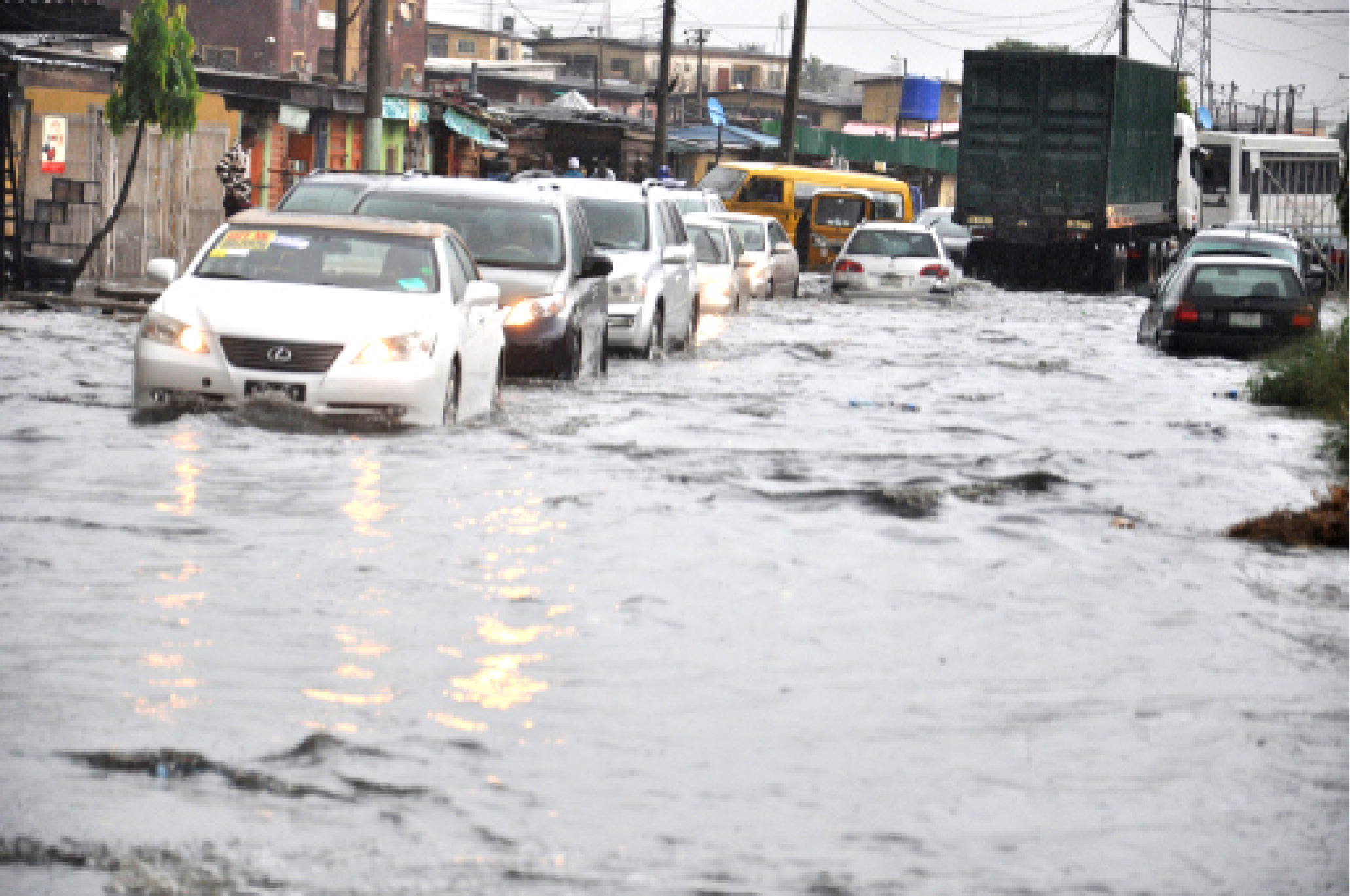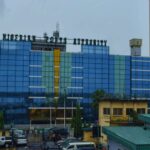Rainfall is a natural blessing from God. It is not only desired but people pray fervently for rain especially during the annual farming season. But for Lagos residents, rainfall has become a nightmare in recent times. They are however, helpless as more rains are expected as the rainy season peaked. Eko Trust reports.
Prior to the full commencement of the rain, many residents had expressed fears over impending flood across the state. In the early parts of 2019, intermittent rainfalls across the state have been accompanied with flashes of flood across the state, raising fears of increasing rate of flood when the rainy season takes up in full swing.
From Lagos Island to the Mainland, Lagos East, West and Central, it has been more pains for Lagosians as it rained across the state.
Since the commencement of rainy season in 2019, the state has never witnessed persistent heavy downpour like last week and this week, when there was ceaseless downpour for seven days.
Motorists, pedestrians and residents of Lagos have one story or the other to tell about the devastating floods accompanying the rainfall. This, they say, has worsened traffic gridlock across the state.
Many residents, who spoke to Eko Trust also attribute the flood to presence of bad spots on major roads across the state. The development has caused untold hardship on the people who spend more hours inside the traffic gridlock. The gridlock did not subside yesterday as the flash floods were yet to dry up in some areas.
Our correspondents, who monitored the situation across the state on Monday as the downpour continued, report that flash floods were experienced in major areas in Ikeja, Agege, Ikorodu, Iju, Obalende, Lekki, Badagry, Ojodu, among hundreds of other areas in Lagos.
The current experience has confirmed fears earlier expressed about government’s unpreparedness for the rainy season. Many local governments and local council development areas folded their hands as the rainy season began except few of them like Agege Local Government which had embarked on drainage clearing and de-silting of waterways.
This did not however stop the flash floods from taking over the entire state and practically shut down human and vehicular movements across the state.
A resident, Mr Gbolahan Soaga, who lives on the Mainland and works at the Island, recounted his experience: “I was on my way to my office on the Island last Friday, June 28, 2019, and I was trapped along the road. I was trapped between 8am and 1pm along the Lagos-Ibadan expressway. It was standstill (no vehicular movement) between Alausa Secretariat in Ikeja and old toll gate around the Motorways/7up axis for hours.
“I was compelled to turn back home. This was because of the downpour that made the Estate at Alapere and Ogudu ends flooded. I believe the problem is largely drainage. Of course, there are bad portions of roads that require urgent repair. Perhaps, the road was not that bad before the rainfall.”
Mr Azeez Haruna, who works and lives in Ikorodu, also said the deplorable condition of Isawo road in Agric bus stop during rainfall.
“The immediate past government abandoned the construction of the Isawo road, thus leaving the road with no drainage by the sides. Anytime it rains, water has nowhere to pass through; hence, life has been difficult for people in the vicinity. Once it rains, the water stays on the road. No vehicle dare pass through immediately to avoid being trapped. Vehicles start moving after some hours and this usually leads to heavy traffic. I work along the road and I know what people pass through due to the abandoned road that has since become a nightmare.”
One of the marketers for a dairy company in Lagos, Mr Muyideen Aroyehun, noted that there are many parts of Lagos that are affected by flash floods.
He said: “Ipaja Ayobo is usually a no-go area every time it rains especially that portion of the road between Oluwaga and Ayobo. The drainage is blocked but the water usually subsides 30 minutes after rain stops. Also, there is usually a flash flood at Ajasa command road at Agbado Oke-odo Local Council Development Area (LCDA). There is a small bridge there which is filled with water during rain.”
Mr Aroyehun added: “The flood at vulcanizer bus stop at Akowonjo road in Egbeda is usually heavy. Once it rains heavily, it sometimes takes up to two days before the water disappears. It’s usually so bad that water enters people’s house due to the way the road was constructed.”
Mr Yusuf Oladimeji, called the attention of our reporter to the flash flood opposite the Ejigbo LCDA secretariat. Recounting his experience on the last Friday’s downpour, he said, “The flood between the entrance of Ejigbo LCDA and Access Bank along the Ikotun road is beyond comprehension. The water on the road reached the knee and it was difficult to move in it. It was even more difficult to distinguish between the road and the drainage. A woman wanted to take her child across during the heavy downpour sometimes ago. I was the one that helped dragged the child to the other side of the road. She couldn’t take the child alone for fear of the flood sweeping the child away.”
Elder John Babatunde Agbaje, who lives along Badagry in Ojo Local Government, told one of our correspondents yesterday, that he left his house by 5:00 am and didn’t get to the Island until around 12 pm. He said: “The road is so bad to the extent that when you get to Barack, you have to park your car and the Hausa people would have to back you because of the water. So they will walk through the water and if you are very unfortunate and you fall inside the water, that’s the end of your journey that very day”.
A resident of Lekki, who identifies himself simply as Mr. Wale, also laments the effect of the flood, saying, “Coming out of our houses is a nightmare, you have to use a bike to pass through the flood for those who don’t have a car. In fact the whole of Lekki is a mess! V.I too”, he said.
“The flood is terrible. We need a good drainage system in Lagos. We were told this is a mega city and I don’t see anything mega here when it is raining. We are all scared to go about our daily activities.”
A month after the administration of Babajide Sanwo-Olu was birthed, many people say the flood problem is a huge burden that he has to tackle with multifaceted solutions to avoid the impending danger of loss of lives and properties.
The state government is not unaware of the statewide flood and the impending emergency it portends. This is why the state Emergency Management Agency (LASEMA) has commenced sensitization of residents on the flood situation.
Chief Executive Officer of LASEMA, Dr. Olufemi Oke-Osanyitolu told Eko Trust that the agency has activated its response teams while sensitizing residents to be vigilant and avoid activities that could obstruct free flow of water in the drainages. He also confirmed that the agency is working together with the Ministry of Works on fixing bad portions of roads across the state which has worsened the gridlock.
But will the pains of Lagos go away anytime soon. This appears a tall dream as more rainfalls are expected. Observers say only a holistic approach to managing the situation would reduce the pains of Lagosians.

 Join Daily Trust WhatsApp Community For Quick Access To News and Happenings Around You.
Join Daily Trust WhatsApp Community For Quick Access To News and Happenings Around You.


